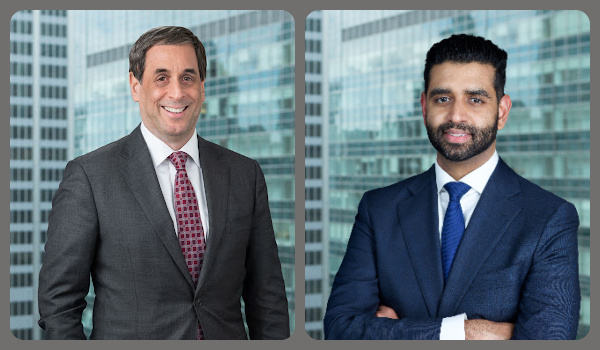The fintech sector remains fragmented, signaling a significant opportunity for mergers and acquisitions to drive efficiency and growth. Even as increased interest rates push up the cost of capital, fintech M&A remains red hot – Especially deals within the wealthtech segment.
Digital Wealth News recently sat down with Mitch Spector, Berkshire Global Advisors Partner and Head of the global fintech practice, and Ajmal “AJ” Hachim, a vice president with the firm who helps lead the team.
Founded 40 years ago, Berkshire Global Advisors has advised on M&A transactions with firms that involve over $1 trillion in assets under management through 500 client engagements. Spector has served in various leadership roles since joining the firm in 2004, while Hachim joined the team in 2019 as its position within the fintech space grew. Today, Berkshire Global Advisors has six team members supporting its fintech practice.
In this discussion, Digital Wealth News and Berkshire Global Advisors covered the current wealthtech M&A landscape, the areas positioned for the most activity and what the future may hold.
DWN: How has the M&A landscape for wealthtech firms changed over the past 12 months, and why?
Mitch Spector: It’s important to recognize that M&A activity generally tends to recover faster than equity financing activity, and wealthtech M&A trends in the US reflect this. Wealthtech deals are starting to pick up after a significant slowdown in both U.S.-based acquisitions and financings in the second half of 2022.
Annual Recurring Revenue (ARR) multiples that buyers assess as part of their due diligence are also recovering, though they still remain well below the frothy levels of 2021. However, acquirers are looking beyond that measure and assessing EBITDA (or cash burn for earlier stage businesses), revenue growth and scalability as well.
AJ Hachim: To build on Mitch’s point, we’re seeing the most buyer interest from larger, private-equity backed financial technology firms. The publicly traded firms that had previously been very active remain somewhat constrained as they are more focused on short-term earnings to support their stock prices.
For example, after raising $1.4bn from Motive Partners and CPP Investments in early 2022, New Zealand-based FNZ emerged as one of the most active consolidators in the fintech arena. So far in 2023, FNZ has announced its acquisition of YieldX, Advicefront and Ifsam to bolster its offerings to the wealth management industry.
DWN: What is Berkshire Global Advisor’s value proposition as an investment banker for wealthtech firms? Who are the “sweet spot” clients that tend to be the best fit with your capabilities?
Spector: Berkshire Global Advisors has been the leading advisor in wealth management and asset management M&A for decades. The relationships that we have built with the strategic buyers and strategic investors such as banks, insurance companies, broker dealers, asset managers and financial technology firms at both the corporate development level and corporate venture level are unparalleled in the industry.
Our sell-side clients benefit from our access to decision makers and even more so from our ability to match a seller’s strategic priorities with firms that are most likely to be the right fit.
These strategic seller priorities include, but are not limited to, price, deal structure, management roles, revenue and expense synergies, etc.
Hachim: Importantly, we bring extensive front-line experience to the process. Since its establishment, Berkshire Global Advisors has leveraged its global network to provide advisory services on the transfer of over $1 trillion of assets under management through more than 475 successful client engagements.
Recent successes include advising wealthtech clients in completing transactions with strategic partners such as Vanguard, State Street, Institutional Shareholder Services, Prudential and First Trust. We’re truly a global company.
As we continue to grow our fintech practice, we’re looking to serve our clients in Europe and Asia-Pacific by leveraging resources in our London and Sydney offices, respectively.
DWN: Are there any specific segments within the wealthtech space – such as regtech, cybersecurity, workflow automation, etc. – that are especially interesting to you right now, and if so, why?
Spector: Over the last two years we have been very active in the direct indexing segment, including tax loss harvesting, values-based customization such as (ESG and impact investing), and mitigating the risks of concentrated positions. We’re essentially providing hyper-personalization at scale. We think this segment, which also comprises rebalancing and tax lot optimization, will remain active.
Regtech is a segment we are spending a lot of time on. Compliance as a Service is a fast-growing revenue opportunity as the regulatory environment remains increasingly dynamic. Additionally, risk management and client onboarding capabilities are also in demand.
Hachim: There is a financial advisor need for technology that improves client engagement and prospecting. Artificial intelligence and machine learning are beginning to create a better customer experience in ways that can be scaled and that wealthtech platforms will need to enable.
Additionally, as the digital assets industry continues to mature, we expect to see a strong demand for access to these investments. Services ranging from digital asset custody, including both tokens and NFTs, to decentralized finance investment products, will be top of mind as investors continue to seek alternative ways to allocate capital.
DWN: Any predictions on key wealthtech M&A trends for the rest of 2023 and beyond?
Spector: The biggest trend will be a continued increase in overall activity. We expect near-term transactions to be accomplished primarily through bilateral negotiations or very targeted sale processes rather than through broad auction processes.
Depending on macro conditions, but hopefully by late 2023 or early 2024, we would expect the larger publicly traded acquirers to become more active as either their stock prices recover, their organic revenue growth slows, or both.
At that point, I would expect more traditional auction type sale processes to ramp up again. Thanks to both strategic buyers and private equity buyers, there remains a tremendous amount of capital at play in the sector and we are bullish about the opportunities that will be available for many of our clients.
Financial advisors and other wealth management professionals likely will need to provide access to digital assets, primarily Bitcoin and Ethereum, to an increasing large part of their client base. Given the direction of SEC enforcement efforts, this will require custody at regulated financial institutions.
Technology that allows advisors to seamlessly incorporate digital assets into portfolios – such as trading, custody, compliance, reporting and risk analysis – could become a strategic acquisition priority for all large wealthtech providers.
Hachim: Current volatility in crypto markets notwithstanding, I expect continued demand for Web 3 capabilities as firms work to remain competitive in gathering the next generation of investors, while building up global capabilities across multiple regulatory and cultural environments.







